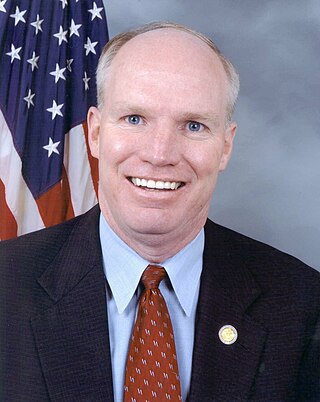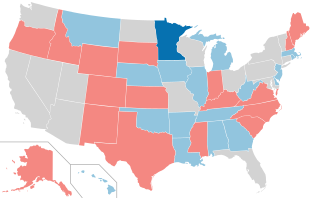Related Research Articles

Thomas Timothy Holden is an American politician from Pennsylvania who served as a Democratic member of the U.S. representative for Pennsylvania's 17th congressional district from 1993 to 2013. Holden was the dean of the Pennsylvania Congressional Delegation during the 112th United States Congress. On April 24, 2012, Holden was defeated in the Democratic primary in his attempt to seek re-election after the boundaries of his district were redrawn. He is now chairman of the Pennsylvania Liquor Control Board.

Sander Martin Levin is an American politician who served in the United States House of Representatives from 1983 to 2019, representing Michigan's 9th congressional district. Levin, a member of the Democratic Party from Michigan, is a former ranking member on the House Ways and Means Committee; he was Chairman of the Ways and Means Committee from 2010 to 2011. He was the older brother of former U.S. Senator Carl Levin, and is the father of former Congressman Andy Levin, his successor.

The 1996 United States Senate elections were held on November 5, with the 33 seats of Class 2 contested in regular elections. Special elections were also held to fill vacancies. They coincided with the presidential election of the same year, in which Democrat Bill Clinton was re-elected president.

The 1990 United States Senate elections were held on Tuesday, November 6, 1990, with the 33 seats of Class 2 contested in regular elections. Special elections were also held to fill vacancies. The Democratic Party increased its majority with a net gain of one seat from the Republican Party. The election cycle took place in the middle of President George H. W. Bush's term, and, as with most other midterm elections, the party not holding the presidency gained seats in Congress. Until 2022, this had been the only election cycle where only one U.S. Senate seat flipped parties.

The 1988 United States Senate elections were elections for the United States Senate. Held on November 8, the 33 seats of Class 1 were contested in regular elections. In spite of the Republican victory by George H. W. Bush in the presidential election, the Democrats gained a net of one seat in the Senate. Seven seats changed parties, with four incumbents being defeated. The Democratic majority in the Senate increased by one to 55–to–45.

The 1986 United States Senate elections were elections for the United States Senate. Held on November 4, in the middle of Ronald Reagan's second presidential term, the 34 seats of Class 3 were contested in regular elections. The Republicans had to defend an unusually large number of freshman Senate incumbents who had been elected on President Ronald Reagan's coattails in 1980. Democrats won a net of eight seats, defeating seven freshman incumbents, picking up two Republican-held open seats, and regaining control of the Senate for the first time since January 1981. This remains the most recent midterm election cycle in which the sitting president's party suffered net losses while still flipping a Senate seat.

The 1984 United States Senate elections were held on November 6, with the 33 seats of Class 2 contested in regular elections. They coincided with the landslide re-election of President Ronald Reagan in the presidential election. In spite of the lopsided presidential race, Reagan's Republican Party suffered a net loss of two Senate seats to the Democrats, although it retained control of the Senate with a reduced 53–47 majority. Democrats defeated incumbents in Illinois and Iowa, and won an open seat in Tennessee, while Republicans defeated an incumbent in Kentucky.

The 1982 United States Senate elections were held on November 2, 1982. They were elections for the United States Senate following Republican gains in 1980. The 33 Senate seats of Class 1 were up for election in 1982. A total of four seats changed hands between parties, with Democrats winning seats in New Jersey and New Mexico, and Republicans taking seats in Nevada and the seat of the lone independent, Senator Harry Byrd Jr., in Virginia. Democrats made a net gain of one seat bringing them to 46 seats, while Republicans stayed at 54 seats for a majority. However, the Democratic gain in New Jersey replaced a Republican that had been appointed earlier in the year.

The 1980 United States Senate elections were held on November 4, coinciding with Ronald Reagan's victory in the presidential election. The 34 Senate seats of Class 3 were contested in regular elections. Reagan's large margin of victory over incumbent Jimmy Carter gave a huge boost to Republican Senate candidates, allowing them to flip 12 Democratic seats and win control of the chamber for the first time since the end of the 83rd Congress in January 1955.

The 1978 United States Senate elections were held on November 7, in the middle of Democratic President Jimmy Carter's term. The 33 seats of Class 2 were contested in regular elections. Special elections were also held to fill vacancies.

The 1976 United States Senate elections was an election for the United States Senate. Held on November 2, the 33 seats of Class 1 were contested in regular elections. They coincided with Democrat Jimmy Carter's presidential election and the United States Bicentennial celebration. Although almost half of the seats decided in this election changed parties, Carter's narrow victory did not provide coattails for the Democratic Party. Each party flipped seven Senate seats, although, one of the seats flipped by Democrats was previously held by a Conservative.

The 1972 United States Senate elections were held on November 7, with the 33 seats of Class 2 contested in regular elections. They coincided with the landslide re-election of Republican President Richard Nixon. Despite Nixon's landslide victory, Democrats increased their majority by two seats. The Democrats picked up open seats in Kentucky and South Dakota, and defeated four incumbent senators: Gordon Allott of Colorado, J. Caleb Boggs of Delaware, Jack Miller of Iowa, and Margaret Chase Smith of Maine. The Republicans picked up open seats in New Mexico, North Carolina, and Oklahoma, and defeated one incumbent, William B. Spong Jr. of Virginia.

The 1970 United States Senate elections was an election for the United States Senate. It took place on November 3, with the 33 seats of Class 1 contested in regular elections. Special elections were also held to fill vacancies. These races occurred in the middle of Richard Nixon's first term as president. The Democrats lost a net of three seats, while the Republicans and the Conservative Party of New York picked up one net seat each, and former Democrat Harry F. Byrd Jr. was re-elected as an independent.

The 1964 United States Senate elections were held on November 3. The 33 seats of Class 1 were contested in regular elections. Special elections were also held to fill vacancies. They coincided with the election of President Lyndon B. Johnson by an overwhelming majority, to a full term. His Democratic Party picked up a net two seats from the Republicans. As of 2023, this was the last time either party has had a two-thirds majority in the Senate, which allowed the Senate Democrats to override a veto, propose constitutional amendments, or convict and expel certain officials without any votes from Senate Republicans. However, internal divisions would have prevented the Democrats from having done so. The Senate election cycle coincided with Democratic gains in the House in the same year.

The 1954 United States Senate elections was a midterm election in the first term of Dwight D. Eisenhower's presidency. The 32 Senate seats of Class 2 were contested in regular elections, and six special elections were held to fill vacancies. Eisenhower's Republican party lost a net of two seats to the Democratic opposition. This small change was just enough to give Democrats control of the chamber with the support of an Independent who agreed to caucus with them, he later officially joined the party in April 1955.

The 1916 United States Senate elections were elections that coincided with the re-election of President Woodrow Wilson. This was the first election since the enactment of the Seventeenth Amendment that all 32 Class 1 Senators were selected by direct or popular elections instead of state legislatures. Republicans gained a net of two seats from the Democrats, and then a furthered seat through mid-term vacancies thereby reducing Democrats to a 53-43 majority.

Michael R. Cooney is an American politician who served as the 36th lieutenant governor of Montana from 2016 to 2021. He previously served in the Montana House of Representatives (1977–1981), as the secretary of state of Montana (1989–2001), in the Montana Senate (2003–2011), as the president of the Montana Senate (2007–2009) and ran unsuccessfully for Governor of Montana in 2000. Cooney was the Democratic nominee for governor of Montana in the 2020 election, losing to Republican U.S. Representative Greg Gianforte.
Franke Wilmer is an academic and a politician. She was a Democratic member of the Montana House of Representatives, representing Districts 63 and 64 from 2007 to 2015. Before first running for office in 2006, Wilmer was appointed to chair the Montana Human Rights Commission by Governor Schweitzer in 2005. She received both a master's and PhD from the University of Maryland in 1990 and is currently a full professor of Political Science at Montana State University.
Art Wittich is an American politician from Montana. A member of the Republican Party, he was a member of the Montana Legislature, in the Montana Senate from Senate District 35, and then the Montana House of Representatives, from House District 68.
Brad Johnson is an American politician from the U.S. state of Montana. A member of the Republican Party, he served as chairman of the Montana Public Service Commission where he left office in January 2023. Johnson is a candidate in the Republican primary in the 2024 United States Senate election in Montana.
References
- ↑ "Our Campaigns - MT At-Large - D Primary Race - Jun 04, 1996".
- ↑ "Federal Elections 96: U.S. House Results - Montana".
- ↑ "Our Campaigns - MT State House 029 Race - Nov 05, 2002".
- ↑ "Our Campaigns - MT State House 064 Race - Nov 02, 2004".
- ↑ "Our Campaigns - MT State Senate 32 Race - Nov 07, 2006".
- ↑ "Our Campaigns - MT State Senate 32 Race - Nov 02, 2010".
- ↑ "Sessions". Archived from the original on 2008-04-25. Retrieved 2008-04-14.
- ↑ Johnson, Charles S. (March 8, 2012). "Jent drops out of governor's race, leaving Bullock as lone Democrat". Billings Gazette . Retrieved March 9, 2012.